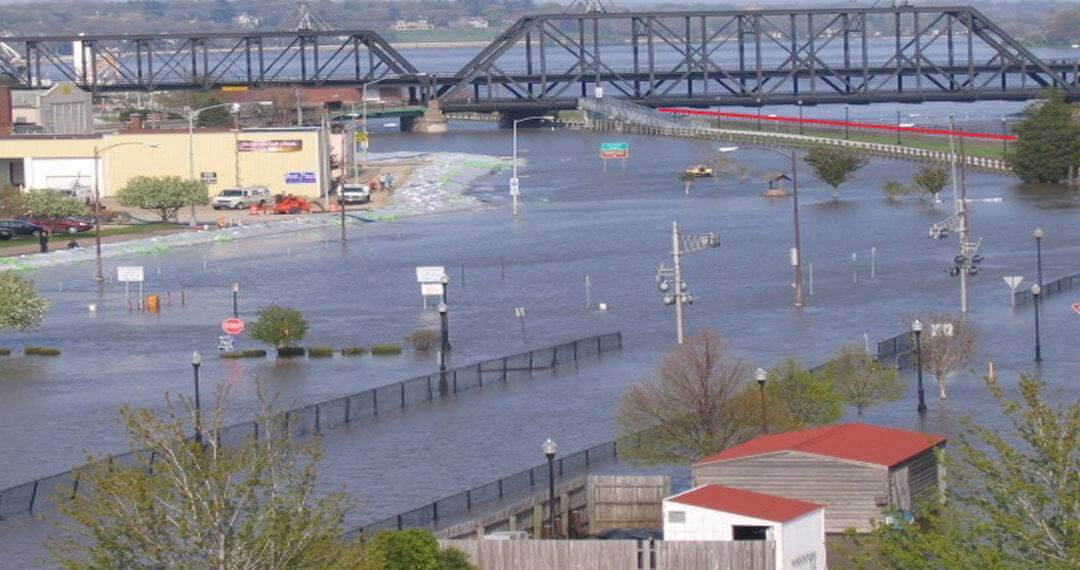
Iowa can definitely claim its fair share of natural disasters, especially when it comes to flooding in cities like Des Moines, Storm Lake, Okoboji, Cedar Rapids, Fairmont, and Spencer. In situations such as these, the businesses and homes that recover most quickly are the ones that took the time to map out some kind of disaster contingency plan before an emergency or catastrophe has occurred.
By taking the necessary precautions and properly planning for the possibility of a disaster you can help boost your chances of a quick and less painful recovery for your home or business. When you arrange a contingency plan in the form of a preparedness guide or a set of well-rehearsed actions you will be taking steps to ensure your business will survive and recover from an unforeseen disaster.
ServiceMaster by Rice suggests a general framework for building your emergency plan for your home or business in the event of a disaster – such as the floods that are so common in Des Moines, Sioux Center, Carroll and West Des Moines.
Take preventive steps
While predicting when a flood or other disaster may strike is almost impossible to do, assessing certain risks in regard to physical placement of important equipment, documents and other assets is essential. When sitting down to map out a plan it may seem obvious to place important elements off the floor and in high places that will more than likely avoid water damage during a flood, but in most day to day actions preparing for a flood isn’t at the forefront of an individual’s mind – placement of important possessions becomes an afterthought and can end up in a low filing cabinet or set of drawers. Be aware of your actions and get in the habit of placing essential items in places that probably won’t be touched by flood water.
Designate evacuation routes & emergency exits
Before any type of emergency ever occurs – flooding, fire, or other disaster, establish a primary and secondary evacuation plan complete with emergency exits and outside gathering place for ease in accounting for each employee. Ensure the evacuation routes and exits are clearly visible, well lit and easily accessible for everyone. Hold practice drills on a regular basis to guarantee each employees’ understanding of the procedures. Preparing for the eventuality of a disaster is the best way to safeguard against the physical danger a catastrophic event holds for your employees.
Build up an emergency kit with more than first aid supplies
It is important to include first aid supplies such as rubbing alcohol, bandages and gauze in your emergency kit, but there are other supplies that should also be present and tend to be left out. Nonperishable food, bottles of water, flashlights with extra batteries, a tool kit, battery-powered radio and blankets should also be included in a well-stocked emergency kit. Be sure to store your emergency kit in an easily accessible, dry space.
Maintain a current list of emergency contact numbers
In conjunction with the standard list of emergency phone numbers for police, hospitals and ambulances, also include contact information for your distributors, suppliers and customers. It would be wise to make multiple copies and keep at least one off site.
Create backup copies of essential data & programs & protect critical business records
Lock up your most important documents in a safe that has been tested and listed by Underwriters Laboratories (UL) as being resistant to water, burglary tools, heat and fire.
Store the copies of your critical programs and data in a completely separate location than your primary facility.
Thoroughly understand your insurance coverage & keep insurance information handy
Make sure you work closely with your insurance agent to employ the best plan and coverage for the type(s) of disasters your business or home is at risk for. For Iowa, flooding is of great concern and should be taken seriously, especially when it comes to insuring your livelihood.
Once your insurance is set up, make copies of the information and keep your material and contact names in easily accessible places. Being able to produce the necessary information will help expedite the claim process.Be sure to review your insurance plan and coverage often to ensure you are completely covered for any potential risks.
Natural disasters are frightening and generally cause a lot of damage and havoc. You can help mitigate some of the stress and uncertainty that come with natural disasters by being prepared and taking steps to prevent the potential damage that can happen to your home or business. If your business or home needs flood damage repair, contact us immediately!

